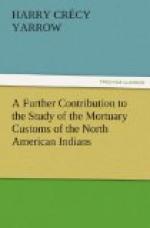It has nearly always been customary to sing songs at not only funerals, but for varying periods of time afterwards, although these chants may no doubt occasionally have been simply wailing or mournful ejaculation. A writer[100] mentions it as follows:
At almost all funerals there is an irregular crying kind of singing, with no accompaniments, but generally all do not sing the same melody at the same time in unison. Several may sing the same song and at the same time, but each begins and finishes when he or she may wish. Often for weeks, or even months, after the decease of a dear friend, a living one, usually a woman, will sit by her house and sing or cry by the hour, and they also sing for a short time when they visit the grave or meet an esteemed friend whom they have not seen since the decease. At the funeral both men and women sing. No. 11 I have heard more frequently some time after the funeral, and No. 12 at the time of the funeral, by the Twanos, (For song see p. 251 of the magazine quoted.) The words are simply an exclamation of grief, as our word “alas,” but they also have other words which they use, and sometimes they use merely the syllable la. Often the notes are sung in this order, and sometimes not, but in some order the notes do and la, and occasionally mi, are sung.
Some pages back will be found a reference, and the words of a peculiar death dirge sung by the Senel of California, as related by Mr. Powers. It is as follows:
Hel-lel-li-ly,
Hel-lel-lo,
Hel-lel-lo.
Mr. John Campbell, of Montreal, Canada, has kindly called the attention of the writer to death songs very similar in character; for instance, the Basques of Spain ululate thus:
Lelo il Lelo, Lelo dead Lelo,
Lelo il Lelo,
Lelo zarat, Lelo zara,
Il Lelon killed Lelo.
This was called the “ululating Lelo.” Mr. Campbell says:
This again connects with the Linns or Ailinus of the Greeks and Egyptians * * * which Wilkinson connects with the Coptic “ya lay-lee-ya lail.” The Alleluia which Lescarbot heard the South Americans sing must have been the same wail. The Greek verb [Greek: ololuzo] and the Latin ululare, with an English howl and wail, are probably derived from this ancient form of lamentation.
In our own time a writer on the manner and customs of the Creeks describes a peculiar alleluia or hallelujah he heard, from which he inferred that the American Indians must be the descendants of the lost tribes of Israel.
GAMES
It is not proposed to describe under this heading examples of those athletic and gymnastic performances following the death of a person which have been described by Lafitau, but simply to call attention to a practice as a secondary or adjunct part of the funeral rites, which consists in gambling for the possession of the property of the defunct. Dr. Charles E. McChesney, U.S.A., who for some time was stationed among the Wahpeton and Sisseton Sioux, furnishes a detailed and interesting account of what is called the “ghost gamble.” This is played with marked wild-plum stones. So far as ascertained it is peculiar to the Sioux. Figure 33 appears as a fair illustration of the manner in which this game is played.




